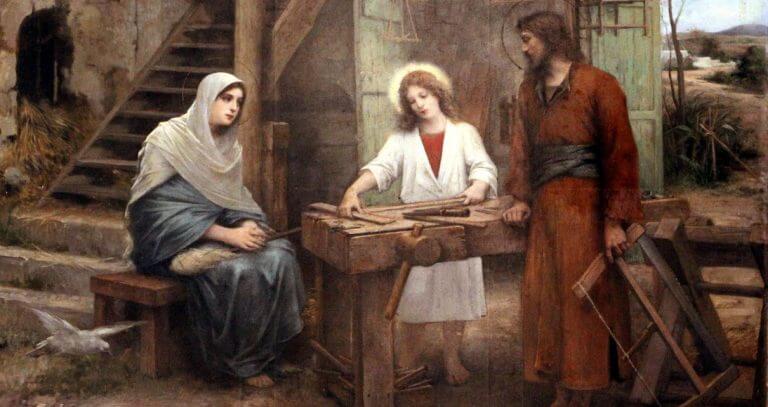A common misconception by Catholics and non-Catholics alike is the idea that a spiritual life is separate from one’s personal, social, and family life. Sunday is for Mass, but after that’s over, forget about God for the rest of the day. Quite the opposite is true. We should be looking to incorporate God in everything we do, whether that be in our jobs, at school, with friends or family, or anywhere else we may find ourselves. This was one of the main messages of Opus Dei, the prelature founded by St. Josemaria Escriva, and one of the many examples set by Jesus’ foster father, St. Joseph.
In this month’s installment of 19 on the 19th, a series that brings you 19-minute reflections on St. Joseph each month, Cale Clarke, host of The Faith Explained and The Cale Clarke Show on Relevant Radio, explores how St. Joseph showed us what it means to live our Faith in the world and how to sanctify our work.
Cale first turned to the Gospel, not to quote St. Joseph as there are no recorded words from him, but to show how he spoke to us in other ways. Cale pointed out that even Christians and Catholics seem to have this notion that work is a punishment or result of Original Sin, just as sickness and death are. However, this can’t be true because work existed even before Adam and Eve committed the Original Sin. They were tasked with tilling and keeping the Garden of Eden.
So, turning to the New Testament, we can see this “Theology of Work” as Cale calls it. Even though Joseph has no words, he is present to protect the Holy Family, provide for them, and to teach Jesus the profession of carpentry. “I think we need to do away with the expression ‘secular job’ or ‘secular vocation.’ The truth of the matter is that any honest profession or work can be made holy and can be a place where we can find God,” explained Cale.
Well, how do we know that? How do we know that God is present everywhere, even outside the Mass? How do we know that He is watching and blessing us with His grace through the sanctification of our work?
Cale called us to envision the “sacred compass”: a series of concentric circles drawn to represent the levels of holiness we experience depending on our distance from the center. The center would represent the holiest place, entirely in God’s presence. That’s where the tabernacle and the Ark of the Covenant would be. Then if we take a step out from the center we reach the antechamber, a garden where they would put things like the menorah, the seven-branched candelabra to represent the Tree of Life. One circle further out and we reach the courtyard, an area dedicated to making sacrifices to God. Outside that was the camp or the living quarters of the Hebrews. And lastly was the area “outside the camp,” the furthest area from the tabernacle.
When Christ died, it is said that the temple curtain was rent in two, from top to bottom. Not only was this a physical act of God, but it was symbolic as well. It was signifying that no longer does your proximity to the temple affect your proximity to God. It is the tearing down of a barrier. Instead, Jesus is acting as Pontifex, “bridge-builder.” He is building a bridge between God and man, letting us know that He is everywhere, and we can sanctify everything we do, just as St. Joseph did.
“You know what the problem is with a living sacrifice? A living sacrifice can always crawl off the altar because we’ve got free will. We’ve got to choose to lay our lives down for Christ.” While more and more people every day are giving up true religion to follow pseudo-spiritualities, Cale points out the reason it’s so difficult to stay the course. We have free will, that gift from God which grants us the choice to follow Him or to stray. While it is easier to give in to laziness, selfishness, pride, greed, we are called to use that gift from God as He intended. One way that helps us to stay that course and stay on that altar is to realize that God is a part of everything we do and choose to sanctify our work, our play, our joys and our sorrows for Him.
Learn more about St. Joseph by listening to or reading the full 19 on the 19th talks below:
You can sign-up to Experience the Year of St. Joseph with Relevant Radio® and receive every episode of 19 on the 19th in your inbox each month. You’ll also receive a FREE ‘Living the Year of St. Joseph’ booklet which includes the Seven Sorrows and Joys of St. Joseph, the Litany of St. Joseph, and much more! Sign-up and then let your friends and family know about this opportunity to grow closer to Jesus through St. Joseph.
Support Relevant Radio today and bring Christ to others! Your gift will be 100% matched today! Consider joining the St. Joseph Recurring Gift Society by opting to donate $25/month to Relevant Radio. If you join, you will be remembered at daily masses, special masses are offered for members near feasts of St. Joseph, and your intentions are prayed for at the Shrines of St. Joseph.

